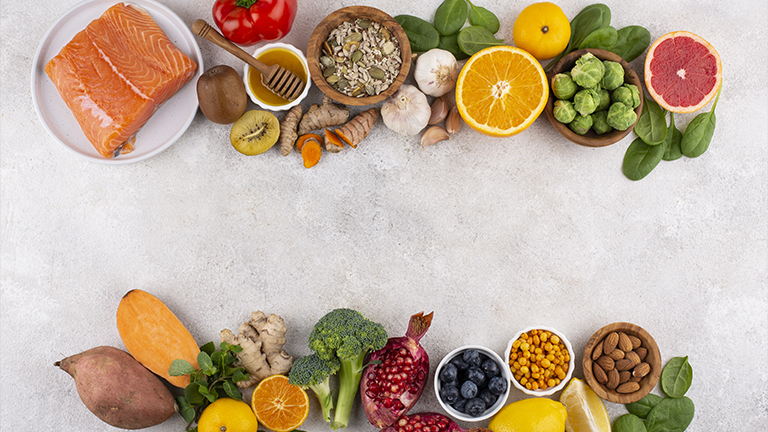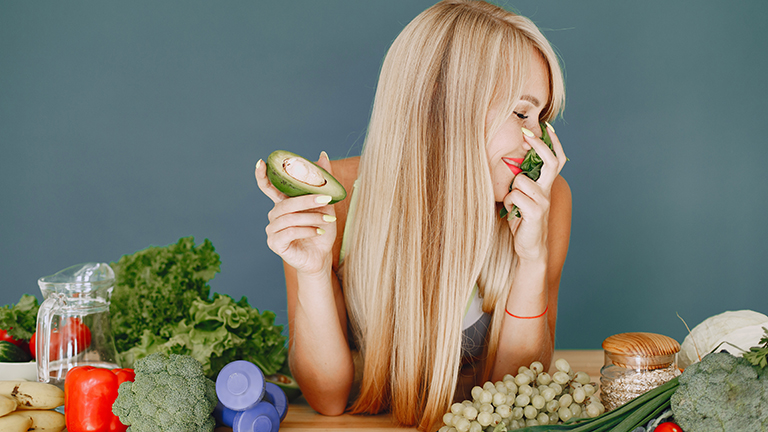Healthy, radiant skin isn’t just about the creams and serums you apply—it starts from within. The foods you eat and the nutrients you consume play a vital role in keeping your skin hydrated, smooth, and youthful. When your body receives the right nutrients for healthy skin, it can protect against aging, repair damage, and maintain a natural glow. In this guide, we’ll explore the essential vitamins, minerals, healthy fats, and antioxidants your skin needs, along with the best foods to include in your diet.
Why Nutrition Matters for Healthy Skin
Your skin is the largest organ in your body, and like any organ, it depends on proper nutrition to function at its best. A poor diet lacking essential nutrients can lead to dryness, premature wrinkles, acne, or dullness. On the other hand, a balanced diet rich in vitamins for glowing skin, minerals for skin repair, and antioxidants for skin care helps strengthen the skin barrier, reduce inflammation, and slow down aging. Simply put, what you put on your plate shows up on your face.
Key Vitamins for Skin Health
Vitamin A for Skin Renewal
Vitamin A plays a key role in cell turnover and skin renewal. It helps reduce acne, fade dark spots, and keep skin smooth. Retinoids (a form of vitamin A) are widely used in skincare products, but you can also boost levels naturally through diet.
Best sources: carrots, sweet potatoes, spinach, and liver.
Vitamin C for Collagen Production
Known as one of the best collagen-boosting nutrients, vitamin C helps maintain skin elasticity and firmness. It also brightens skin tone and protects against sun damage by neutralizing free radicals.
Best sources: oranges, strawberries, kiwi, bell peppers, and broccoli.
Vitamin E for Skin Protection
Vitamin E is a powerful antioxidant for skin care that protects against UV damage and pollution. It also supports skin repair, reducing scars and dryness. Pairing vitamin E with vitamin C enhances sun protection naturally.
Best sources: almonds, sunflower seeds, avocados, and olive oil.
Vitamin D for Skin Barrier Function
Vitamin D plays a role in skin barrier strength and immune defense. Deficiency may lead to dry skin and increased sensitivity. While sunlight is the primary source, you can also get it from certain foods.
Best sources: salmon, egg yolks, fortified dairy, and mushrooms.
Essential Minerals for Glowing Skin
Zinc for Acne Prevention
Zinc is one of the most important minerals for healthy skin, especially for those struggling with acne. It regulates oil production, reduces inflammation, and helps wounds heal faster.
Best sources: pumpkin seeds, oysters, lentils, and chickpeas.
Selenium for Skin Elasticity
Selenium is a trace mineral that protects against sun damage and prevents premature skin aging. It works as an antioxidant, supporting skin elasticity and smoothness.
Best sources: Brazil nuts, tuna, turkey, and brown rice.
Copper for Skin Firmness
Copper helps in the production of collagen and elastin, which are essential for skin firmness and youthful appearance. It also boosts antioxidant enzymes that defend against free radicals.
Best sources: nuts, seeds, shellfish, and dark chocolate.
Healthy Fats and Antioxidants for Radiant Skin
Omega-3 Fatty Acids for Hydration
Essential fatty acids like omega-3s help maintain the skin’s lipid barrier, preventing dryness and irritation. They also reduce inflammation, making them beneficial for conditions like eczema or acne.
Best sources: salmon, chia seeds, flaxseeds, and walnuts.
Antioxidants to Fight Free Radicals
Free radicals from pollution, stress, and UV rays speed up aging. Antioxidants protect your skin cells by neutralizing these harmful molecules. A diet rich in antioxidants for skin care leads to a smoother, brighter complexion.
Best sources: blueberries, green tea, dark chocolate, and leafy greens.
Best Foods Rich in Skin-Friendly Nutrients
If you want naturally glowing skin, focus on skin-friendly foods and diet choices such as:
- Fatty fish (salmon, sardines, mackerel) – rich in omega-3 and vitamin D
- Nuts and seeds (almonds, walnuts, sunflower seeds) – full of vitamin E and zinc
- Leafy greens (spinach, kale, broccoli) – packed with vitamins A, C, and antioxidants
- Colorful fruits (berries, oranges, papaya) – high in vitamin C and collagen boosters
- Whole grains & legumes – provide zinc, copper, and seleniumHow Nutritional Deficiencies Affect Skin Health
A lack of proper nutrients can show up on your skin before anywhere else in your body. For example:
- Vitamin C deficiency → dull skin and slower wound healing
- Vitamin D deficiency → dry, itchy skin and increased risk of acne
- Zinc deficiency → acne breakouts and delayed skin repair
- Omega-3 deficiency → dryness, inflammation, and accelerated aging
This is why a balanced diet is just as important as a good skincare routine.
Tips to Improve Skin Through Diet & Lifestyle
- Stay hydrated: Drink plenty of water to maintain skin elasticity.
- Eat a colorful plate: Different fruits and vegetables provide a wide range of nutrients.
- Limit sugar and processed foods: They accelerate skin aging and inflammation.
- Include healthy fats daily: Omega-3 and omega-6 fatty acids help skin stay plump.
- Practice stress management: Stress can deplete key skin nutrients and worsen acne.
- Get enough sleep: Rest supports natural skin regeneration and collagen repair.
Conclusion: Eating for a Healthy, Youthful Glow
Glowing skin isn’t just about external care—it’s about nourishing your body from within. By focusing on nutrients for healthy skin such as vitamins A, C, D, and E, essential minerals like zinc and selenium, plus omega-3 fatty acids and antioxidants, you can achieve a radiant complexion naturally. Combine these nutrients with a balanced lifestyle, proper hydration, and good sleep habits, and you’ll support your skin’s health for years to come.


